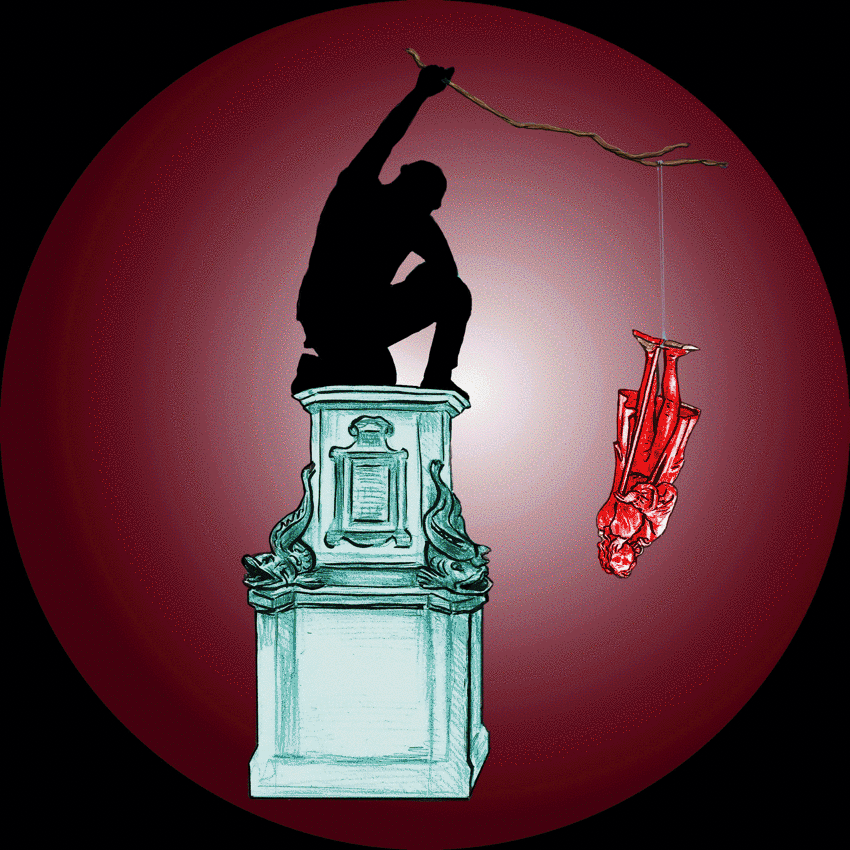
culture wars cancel culture
FRUITING BODIES
Animated GIF inspired by BLM protests in Bristol, centring around the toppling of the statue of Edward Colston.

there is hope for us
Katharine: But to go back to the murder of George Floyd and the Black Lives Matters Movement, and its influence on Britain…, how do you think it has been received…?
Lindsey: I was so blown away and heartened because all these young people were out protesting and wanted to have their voices heard. People weren’t sure whether they should or shouldn’t be out. The government advice was very vague, most people were wearing masks or people were giving them out. I questioned whether I should or shouldn’t go. But I just felt I had to go, it was such an important message that was being said. It was not just about George Floyd. It was about how black people in the criminal justice system are less likely to be treated equitably. I know this annoys some people re. black people banging on about their rights and experience of injustice. But nothing changes if we don’t keep on. And obviously some people are not on the receiving end of any discrimination. I was really gladdened to see that the majority of people out there who were driving this were young. And I thought well, that gives me hope for the future…
Helen: … you told me something quite shocking afterwards. You told me there was this spike in hate crime, because all the…
Lindsey: Yes… Whenever people raise their voices in support, there is always a minority element of people who feel threatened and who will actively go out to abuse people based on their skin colour or religion. There are also people who don’t like change, who are happy with the status quo. With Black Lives Matter, people raised their voices in support. However there is a mind set of people who have who actively try to discredit the movement.
You know it was a really peaceful protest, it was a lovely, lovely atmosphere, a lot of music. You know it was a really nice, obviously some people find that threatening…
Katharine: So, the young people, was that across ethnicity…?
Lindsey: Yes, it was across all ethnicities. I mean, don’t forget we are mostly white people in [the South West] as well. We have got more diversity than we have ever had…
Helen: Do you think Lindsey, that all the energy and the hope and the optimism and the coming together in that moment is carrying on? I mean in a much less significant way but in my mind a sort of parallel way, with everyone coming out and clapping for the NHS.
Lindsey: But I thought that. I didn’t like the clapping for the NHS though, because I always thought if you like what they do why not give them a pay rise? So, I didn’t go to clap for them because I thought that was government led. Give them the bloody clap … that is all you have got is the clap….
Quote from interview with Lindsey, March 2021. Lindsey is from the north of England and is of ‘mixed-heritage’. She is in her 60’s and lives in the South West of England. Lindsey voted to remain in the EU.

‘it’s them!’
(PLACE NAME) was put into a local lockdown, and newspaper articles were coming out of (PLACE NAME) about which areas are the ones that are spreading it, and it made (PLACE NAME) look a certain way, and this was further compounded by the fact that the council – I don’t know whether they read the room, this is where the issue I think arises – they put a local testing centre in what they thought was in the middle of the (PLACE NAME) community, but it happened to be the local park that is surrounded by predominantly the South Asian community, predominantly Muslim and Sikh but also some Hindus who live within the community. So by putting that there it made people think that that’s the reason why it was put there, because that community is the one that is spreading the virus. When actually, if you read between the lines, it was very much put there because it was a place of convenience and it’s on the main route through the city, and it kind of…I guess from their perspective it made sense at the time. So when the news broke all the film crews kind of went to that test centre, so the images and all of that would have been of Asian people, of South Asian people, because the area is predominantly South Asian, and therefore there was a plastered image of a woman in a hijab, a bit similar to me, on a local road, and her image was plastered everywhere across national and international media! So that picture was put out everywhere, and then those conversations started to grow online that, you know, ‘it’s them! It’s them! It’s them!’ and ‘them’ being South Asian, possibly Muslim, or whatever ‘them’ consisted of. So then that issue of race started to really split the city a little bit, and you could see the narrative and the comments: ‘oh, they don’t listen! They still mix! They don’t do this!’ and ‘they don’t even wash their hands!’. There was someone that said almost about ethnic cleansing! There were comments about ethnic cleansing left on things!
Quote from Fatima, April 2021.
Fatima is a working-class British Asian woman in her 30s living in a city situated in the East Midlands. She voted to remain in the EU.
‘BE ACTIVELY ANTI-RACIST’
South West England, November 2020.
Image credit K. Tyler.
‘Kill the Bill’ student protest
South West England, August 2021
Image credit K. Tyler.




